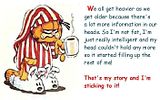Post by charliegirl on Jan 6, 2007 20:04:09 GMT -5
Special education conference features children's attorney
By Joyce Koballa, Herald-Standard
04/04/2006
Diagnosed with multiple learning disabilities in the second grade, a Richmond, Va., attorney recalled how condensation from a pitcher of Kool-Aid and some poster board used at a residential camp he attended served as pivotal tools in overcoming his struggles.
Pete Wright, who represents children with special needs, said he was 7 or 8 years old when he traveled from his home in Washington, D.C., to Camp Mansfield, located at the highest mountain in Vermont, where he spent two months being taught a multi-sensory-based program of language instruction.
It was there that Wright learned to use the five senses that helped him eventually conquer his condition of dyslexia, dysgraphia and attention deficit disorder after being labeled by school officials as borderline mentally retarded and emotionally disturbed.
After the school officials' assessment, Wright's parents stepped in and obtained a private tutor who worked with him every day after school for the next two years.
Wright said people with dyslexia reverse and rotate the letters of the alphabet causing them to hear the wrong sound.
Because of his diagnosis, Wright said he vividly remembers a tutoring session at camp where he drew a "W" on a piece of poster board and an "M" on another.
Wright recalled it was hot that day and not far from the poster board was a pitcher of Kool-Aid with condensation on one side.
"They had us draw with our two fingers a 'W' on the side of the Kool-Aid for 'water' and then (referring to the poster board) visualize pouring the pitcher of Kool-Aid into the W," said Wright.
Wright said he had to determine next which letter would hold more, the "W" or the "M."
"And right there, boom, you've got the link, 'w,' water, and you drank the Kool-Aid," said Wright.
Wright said taste and touch were used in that instance to understand the "w" sound and think it through.
"It's like driving a car...especially if you have a stick shift, you're worried about hitting the brake versus the clutch and the accelerator, but then it becomes automatic," said Wright.
Although the camp no longer exists, Wright said it served as a training facility for many of today's elder statesmen in the multi-sensory approach of Orton-Gillingham.
For the entire article click the link below
www.heraldstandard.com/site/news.cfm?newsid=16424380&BRD=2280&PAG=461&dept_id=480247&rfi=6
By Joyce Koballa, Herald-Standard
04/04/2006
Diagnosed with multiple learning disabilities in the second grade, a Richmond, Va., attorney recalled how condensation from a pitcher of Kool-Aid and some poster board used at a residential camp he attended served as pivotal tools in overcoming his struggles.
Pete Wright, who represents children with special needs, said he was 7 or 8 years old when he traveled from his home in Washington, D.C., to Camp Mansfield, located at the highest mountain in Vermont, where he spent two months being taught a multi-sensory-based program of language instruction.
It was there that Wright learned to use the five senses that helped him eventually conquer his condition of dyslexia, dysgraphia and attention deficit disorder after being labeled by school officials as borderline mentally retarded and emotionally disturbed.
After the school officials' assessment, Wright's parents stepped in and obtained a private tutor who worked with him every day after school for the next two years.
Wright said people with dyslexia reverse and rotate the letters of the alphabet causing them to hear the wrong sound.
Because of his diagnosis, Wright said he vividly remembers a tutoring session at camp where he drew a "W" on a piece of poster board and an "M" on another.
Wright recalled it was hot that day and not far from the poster board was a pitcher of Kool-Aid with condensation on one side.
"They had us draw with our two fingers a 'W' on the side of the Kool-Aid for 'water' and then (referring to the poster board) visualize pouring the pitcher of Kool-Aid into the W," said Wright.
Wright said he had to determine next which letter would hold more, the "W" or the "M."
"And right there, boom, you've got the link, 'w,' water, and you drank the Kool-Aid," said Wright.
Wright said taste and touch were used in that instance to understand the "w" sound and think it through.
"It's like driving a car...especially if you have a stick shift, you're worried about hitting the brake versus the clutch and the accelerator, but then it becomes automatic," said Wright.
Although the camp no longer exists, Wright said it served as a training facility for many of today's elder statesmen in the multi-sensory approach of Orton-Gillingham.
For the entire article click the link below
www.heraldstandard.com/site/news.cfm?newsid=16424380&BRD=2280&PAG=461&dept_id=480247&rfi=6

 I was about to conquer the world but then I got distracted by something shiny.
I was about to conquer the world but then I got distracted by something shiny.
